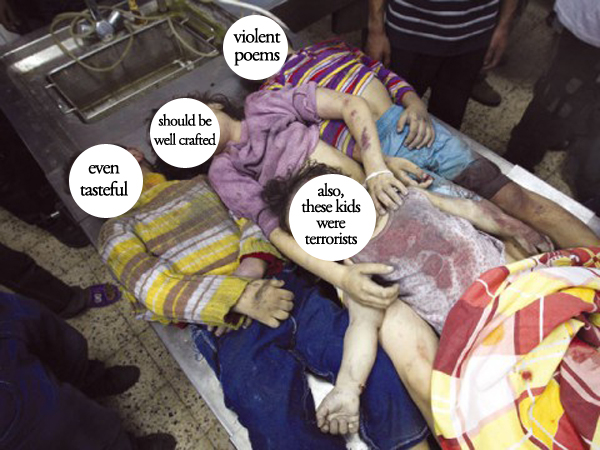
Last week Harvard’s Woodberry Poetry Room hosted Tarpaulin Sky authors Johannes Göransson & Joyelle McSweeney, who joined Stephen Burt for “In Extremis,” a panel discussion on poetry and violence, which sought to answer
What does contemporary poetry gain–and what does it lose—by seeking its own extremes, or trying to violate its own bounds? What are the connections—or contradictions— between the way we imagine innovation, and the way we imagine violence?
Harvard Crimson writer Rebecca A. Greenberg details the ensuing carnage in her October 7th article, “Talking Shock: Prominent Poets Discuss the Limits of a Form“:
This is perhaps one of the most polarizing questions for the vanguards of today’s literary scene. After all, it is framed in the context of an age replete with lurid images available at our fingertips. For many a highbrow critic, excessive sex and gore are undesirable in a lyrical work since these elements have the potential to reduce poetry to kitschy sensationalism….
Göransson, a poet and literary critic of Swedish origin, has also published numerous works in translation, a field he credits with introducing him to more controversial topics in poetry, such as violence in Korean action novels. Explaining how he sees the American literary environment, he noted, “We are a culture with many images flowing over us, but everything is labeled as ‘obscene.’” In his view, the term is not only hypocritical; it may also have a stultifying effect on our nation’s creative output. “Calling a poem ‘tasteless’ is a way to divorce it from the rest of its genre,” Göransson said. He deplores such a dismissal as closing too many doors for the American literary enthusiast.
For Joyelle McSweeney, award-winning poet and cofounder of Action Books, a press that publishes poetry as well as numerous works in translation, violence holds a rightful, even necessary place in poetry…. According to McSweeney, poems should reflect one’s social or political reality rather than skating over uncomfortable topics. “My obligation as a poet is to address the violence going on around me and to bring it into visibility,” she said. However, she does not throw blood on the page for its own sake. “It’s not like, ‘If it doesn’t have enough violence, it isn’t cooked yet,’” she chuckled….
McSweeney and Göransson agreed that poetic works are nothing different from the reality from which they emerge: they simply digest the controversial and vexing events that catch the gaze of any citizen. As McSweeney says, “It’s just that the volume has been turned up.”